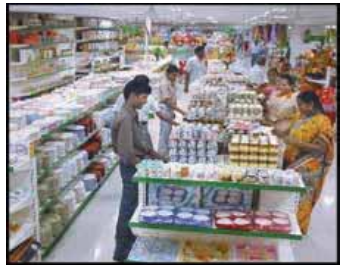Chapter: 11th Commerce : Chapter 24 : Retailing
Departmental Stores: Features, Advantages, Limitations
Departmental Stores
A Departmental Store is a large retail establishment offering a wide variety of products, classified into well defined departments. Each department specialise in one particular line of product aimed at satisfying every customers’ needs under one roof. Each department is like a separate shop with centralised purchasing, selling and accounting. Administrative activities of the departmental stores are managed by a General Manager. The General Manager appoints department managers of each department.

Features
i. Large Size:
A department is a large scale retail showroom requiring a large capital investment by forming a joint stock company managed by a board of directors. There is a Managing Director assisted by a general manager and several department managers.
ii. Wide Choice:
It acts as a universal provider of a wide range of products from low priced to very expensive goods (Pin to Car) to satisfy all the expected human needs under one roof.
iii. Departmentally organised
Goods offered for sale are classified into various departments. Each department specialises in one line of product and operates as a separate unit.
iv. Facilities provided:
It provides a number of facilities and services to the customers such as restaurant, rest rooms, recreation, packing, free home delivery, parking,etc.
v. Centralised puchasing
All the purchases are made centrally and directly from the manufacturers and operate separate warehouses whereas sales are decentralised in different departments.
Advantages
i. Convenience in buying
The departmental stores provide great convenience to all the members in a family in buying almost all goods of their requirements at one place. A large variety of goods available in all the departments enable customers to save time and no need to run from one place to another to complete their shopping.
ii. Attractive services
It aims at providing maximum services and facilities to the customers such as home delivery of goods, execution of telephone orders, rest rooms, restaurants, salons, children game centres, etc.
iii. Central location
These stores are usually located at central places so that more people can approach easily.
iv. Elimination of Middleman
A departmental store combines both the functions of retailing as well as warehousing. They purchase directly from manufacturers and operate separate warehouses. It helps in eliminating undesirable middlemen between the producers and the consumers.
v. Economies of Large Scale Operations
The Departmental stores are organised at a large scale i.e., buy goods in bulk, therefore they enjoy the benefit of special discount. In turn, the customers get their goods in quality and lower price.
Limitations
i. High cost of operations
A departmental store requires a large building with ample parking at a central place. It has to incur heavy expenditure on salaries, maintenance of building, customer services, advertising, etc. As a result, establishment and overhead cost of operations are very high.
ii. Higher prices
Due to high operating costs, prices of goods in a departmental store are comparatively high. Only rich persons can afford to buy goods at a departmental store.
iii. Distance
It is located at a central place of a city, away from people living in suburban areas have to travel a long distance to reach the store.
iv. Lack of personal touch
The management of a store finds it very difficult to maintain personal contact with the customers. The salaried staff may not take interest in securing the satisfaction and goodwill of the customers
v. Difficult to establish
A large amount of capital investment and a large number of specialised persons are required to establish a departmental store.
vi. High risk
Due to central location and large scale operations, risk of loss is very high
Change in tastes and fashion and market fluctuations may lead to heavy loss.
Related Topics